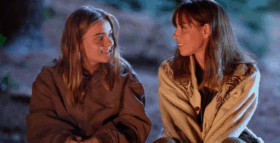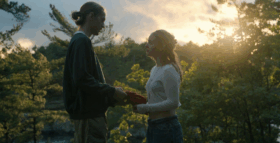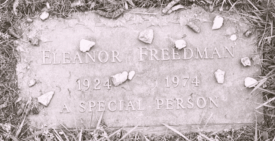
Alejandra and Pablo in Tequesquitengo, Morelos, June 2017
I hate giving advice to grieving people. In fact, my favorite grief advice is for non-grieving people: Stop giving advice. But this time, with the entitlement of this awful club, I’ll say what everyone needs to hear: If it were really in your hands, they’d still be here. It’s as simple and as complicated as that.
Yet we still fantasize about some kind of knowing, some way we could have changed things. And there’s no better way to explore alternate universes than fiction.
My worst waking nightmares are the “what if” ones. Sometimes I try to avoid them by being reckless, by living with a sense of urgency that’s difficult to match. Mostly, I’ve learned to develop patience and remember that wonderful things take time. But I’ll never know which parts of me are entirely the way I would have been without the grief that took over everything when I was young. Maybe it’s all an indiscernible mass, because as much as I wanted to escape it, grief has been a cornerstone of my life.
The thing is, I rarely hold back an “I love you.” If I don’t say the words, I’ll show you in every way possible, because whatever happens in the future, I can’t stand a “what if.”
Yet in the depths of traumatic grief—the kind that rearranges everything you’ve known about life—you’re thrown into the most impossible “what if” thoughts. The unavoidable ones. The most devastating. You get caught up in the worst kind of magical thinking. You suddenly believe you possess some mystical power. You could’ve saved them if you’d only done one, two, three, twelve things differently. Survivors’ guilt and the illusion of control open the door to an alternate universe, one in which you could have avoided the loss, avoided the pain.
“My Old Ass” is a contemporary take on time travel where Elliott (Aubrey Plaza) meets her younger teenage self (Maisy Stella). As any thirty-something woman would agree, there’s so much about this confrontation that feels real. Did I become who we wanted to be? You don’t know what life will throw at us—marvelous and magic and painfully devastating. There’s this absolute jealousy about our young naïveté, and Plaza portrays it with vulnerability, mystery, and dark humor.

Maisy Stella meets the older version of herself, Aubrey Plaza in ‘My Old Ass’ (Photo courtesy of Prime)
Much of the older Elliott’s advice lies in convincing her younger self to avoid a specific person at all costs. With some trauma and storytelling familiarity, it was clear to me that she wanted to unlive something traumatic, but it’s not what we initially imagined.
Chad is adorable, a teenage boy she can’t keep her distance from. He doesn’t show signs of danger. He’s so nice. They should be together, they… Oh! Suddenly it hits.
I know where this is going. It sounds extra familiar to me. She wants to avoid it because it is traumatic, because it changed the course of her life. This mystery and dark humor and I-can’t-tell-you-exactly-if-we-got-what-we-wanted-because-we-did-and-we-didn’t comes from sudden loss of love, from the ways we sometimes try to avoid it because of how it’s entangled with traumatic grief. But as much as we try to change it, to find our way around it, it doesn’t matter. In the end, there’s not one without the other.
I lost one of the greatest loves of my life. That’s how Pablo deserves to be remembered in my story, in our story. He’s not an ex-boyfriend, as some people have tried to label him, as if death could ever loosen the bond. I was struck by how difficult it is for young loves, the ones that didn’t get the labels society regards as enough for the pain we hold, to have a space in the infinity of time.
When you lose someone in that way, there are few tangible ways to measure what you lost. It seems replaceable because you aren’t related by blood and you’re not married. We try to understand love with comprehensible definitions for a very incomprehensible, bigger-than-us matter.
But he deserves a poetic label. I deserve to name this love.
And I know now he’s one of the greatest loves of my life because that’s fair to him, but to be one of them, the possibility of more, is fair to love. It’s fair to me. Pablo has shown me how much love I’m able to hold, even in the most gut-wrenching grief.
Yet I have to confess that, even if just for a brief how would I survive this, I questioned how my life would’ve turned out if we hadn’t met. That’s the difference with romantic, apparently replaceable love—it’s a love I got to choose. And I liked that, even for a slight moment of science fiction, the “what if” grief themes in “My Old Ass” allows us to explore the dilemma.

Percy Hynes White and Maisy Stella as star-crossed lovers (Photo courtesy of Prime)
What if I hadn’t been captivated as a teenager by his rebellious spirit, impulsive intelligence, and wit? What if we’d never been a team in the pool, me on his shoulders, in those first sexually charged, not-so-obvious interactions that make you realize you want someone? What if we hadn’t found out how good we were as a team, the adrenaline of winning together? What if we’d never reunited? Fell in love? Planned on building a life?
What I love about this exploration is that it reminds us of the unavoidable connections, even with the people we choose. There’s something about the pull of some souls that goes beyond reason, even if your thirty-something self tries to tell you not to. Some things are fated.
The truth is, I’d never change it. I’d never avoid loving Pablo. It’s one of the things that has come so easily to me. And I know that by making that statement, I choose to open myself to a life of avoiding “what ifs” and embracing “why nots.”
A life full of love, and risk, and surprise, and adventure. Just like Pablo liked it. But mostly, exactly how I want to live.
P.S. Feliz cumpleaños, chang. Te amo, wherever you are.
Alejandra Redondo is a Mexican actress, writer and co-founder of No Estás Solo Club.
Read this piece in Spanish here.










